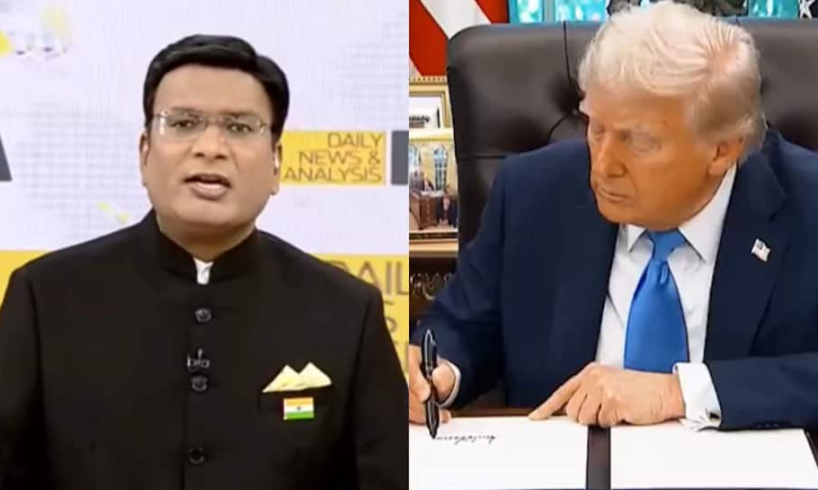
In a move likely to send shockwaves across India’s tech community and Gen Z workforce, U.S. President Donald Trump has approved a sharp increase in the fee for the H-1B visa program, raising it from a previous range of USD 2,000–5,000 to a staggering USD 100,000 per applicant per year, and the new policy, which takes effect on September 21.
The decision, which is set to affect thousands of Indian professionals annually, has drawn widespread criticism from both within the United States and abroad. In today’s DNA episode, Rahul Sinha, Managing Editor of Zee News, analysed the US H-1B visa fee hike and its impact on young Indians:
Watch DNA Episode Here:
Add Zee News as a Preferred Source
#DNAWithRahulSinha | ट्रंप की वजह से कितनी नौकरियां खतरे में? भारत पर ट्रंप के ‘वीजा टैरिफ’ का विश्लेषण
ट्रंप ने H-1B वीजा की फीस में जबरदस्त बढ़ोतरी की, अब सालाना 88 लाख रुपये वीजा फीस देनी होगी। 21 सितंबर से लागू होगी H-1B वीजा की नई फीस#DNA #USA #DonaldTrump #TrumpGoldCard… pic.twitter.com/F5IHqNZmiB
— Zee News (@ZeeNews) September 20, 2025
What is the H-1B Visa?
The H-1B visa is a non-immigrant program established in 1990, allowing U.S. companies to hire skilled foreign professionals in specialized fields like science, technology, engineering, and mathematics (STEM). Initially issued for three years, the visa can be extended to six years. Since 2004, the annual cap has been limited to 85,000 visas, although actual issuances often exceed this due to exemptions for certain institutions.
In the 2022–23 fiscal year, nearly 386,000 H-1B visa applications were approved, with 72 percent granted to Indian citizens. Chinese nationals were a distant second at 12 percent.
Who Will Be Affected?
The newly raised USD 100,000 visa fee will reportedly apply only to new applicants. Current H-1B visa holders will be exempt — unless they have spent over 12 months outside the U.S. In such cases, they must return before September 21 or potentially be subject to the new fee.
This has triggered urgent measures from tech giants like Microsoft and Amazon, which have reportedly asked their Indian employees to return to the U.S. immediately.
Microsoft is said to have issued 24-hour return notices to Indian staff currently based outside the U.S., fearing costly delays and uncertain legal interpretations once the new rule kicks in.
Economic Fallout
The increased cost burden is expected to hit U.S. tech companies the hardest, many of whom rely heavily on Indian professionals. On average, an H-1B visa worker earns USD 118,000 annually — now nearly matched by the visa fee alone, raising concerns over financial feasibility.
Data from the U.S. government shows that companies like Amazon, Meta, Apple, Microsoft, and Google were among the largest beneficiaries of the H-1B program last year. With the new financial strain, companies may drastically reduce the number of foreign workers they hire under this visa category.
Impact on India
This policy shift poses both a challenge and an opportunity for India. The immediate concern is the potential disruption to nearly 200,000 Indian professionals who annually seek employment in the U.S. It also threatens to affect USD 236 billion in cumulative earnings based on current salary averages. Simultaneously, the recent 50 percent tariff by the Trump administration has put an estimated 20 lakh Indian jobs and USD 35 billion in annual exports at risk.
However, it could also be seen as a potential silver lining. With reduced U.S. opportunities, a “reverse brain drain” may occur, prompting talented Indian professionals to return home and contribute to domestic industries, especially in innovation hubs like Bengaluru, Hyderabad, Pune, and Gurugram.
Still, India faces its own hurdles: inadequate infrastructure in Tier-2 cities, limited R&D funding, and uncertainty around startup capital. Trump had already imposed a 50 percent tariff on Indian exports in recent months.
India’s Diplomatic Response
India’s Ministry of External Affairs has responded by stating that the impact of Trump’s decision is under review.
The ministry emphasized the significant contributions of Indian professionals to the U.S. economy and expressed hope that the American administration will reconsider or modify the decision to avoid disrupting the lives of many families.
Legal Challenges
Much like several of Trump’s previous immigration and trade decisions, this policy too is likely to face legal scrutiny. Critics in the U.S. have compared the fee hike to “protection money”. Whether the new visa fee survives judicial review remains to be seen.





